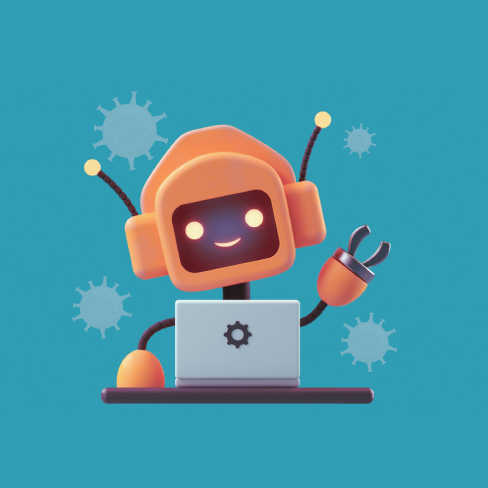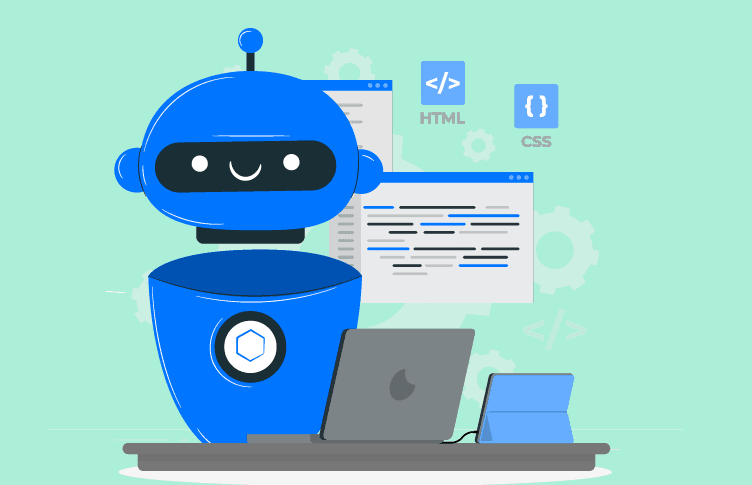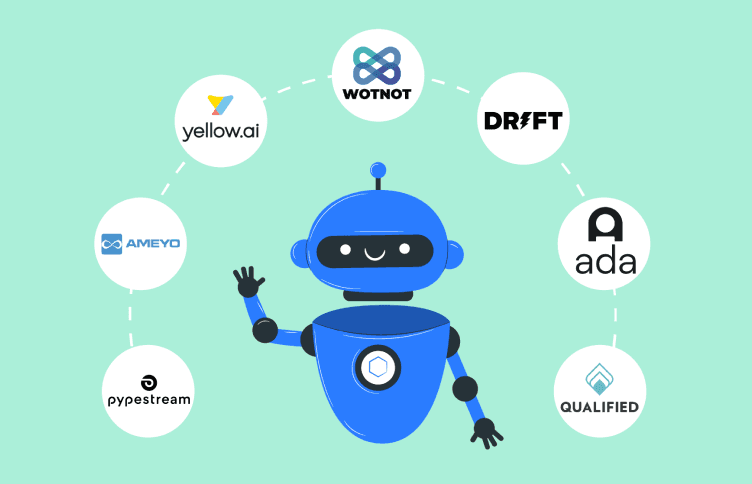Chatbot /
6 Min read
How Chatbots are Transforming businesses in a Pandemic?
June 3, 2021

Hardik Makadia
CEO, WotNot
By far the most hyped technology, Artificial Intelligence has proven its mettle to marketers and sales professionals, and businesses in every industry. Between 2018 and 2020, chatbots for business have increased acceptance of at least 67% across industries. With the onset of the Covid-19 pandemic, the demand for conversational AI has surged even further.
Impact of the Coronavirus Pandemic on The Chatbot Industry
The pandemic has transformed our industries digitally at a pace nothing ever has. With changing customer demands, businesses have had to scale up their digital infrastructure to compete. The pandemic has reduced people’s spending power just as much as it has brought a shift in customer needs. But more than that, the worldwide lockdown and general workspace restrictions in the wake of Covid-19 have directly affected manpower availability, forcing businesses to streamline their operations.
Modern-day customers can often be impatient and demand instant resolution to their queries. An astonishing 90% of customers expect an immediate response from businesses. If not for chatbots, the customer service of most of these businesses would be struggling to even reply to every customer, let alone resolve the issues in time.
Under immense pressure to provide a better customer experience and cut losses due to the pandemic, organizations found it challenging when they started looking for alternative means. With artificial intelligence, machine learning, and natural language processing at their disposal, the chatbot industry has become a critical asset to solve many organizational problems.
Businesses are increasingly getting reliant on chatbots to address their day-to-day redundant tasks and resolve customer queries. According to a report, 80% of the routine customer queries are now closed by chatbots across industries. In the meantime, chatbots for business have diversified their applications and are now being used to boost marketing endeavours and push sales.
Chatbot Industrial Use Cases
Chatbots have a lot more to offer than just quick and efficient request management.
Airline Industry
Chatbots can help customers search for flight information and check for the best option among different vendors to book tickets. They can also help customers upgrade their seats or class, giving options to track baggage or seek information regarding changes in flight timings — all during an automated conversation. As for employees of an airline, chatbots can be used to schedule itineraries, providing everyone with more control and easy access to information. As a real-life example, British Airways has started efficiently using its own chatbot in 2020.
Telecom
With hundreds of thousands to cater to, telecom companies can no longer solely depend on call centres or live agents to offer support. The need of the hour is something more automated and dynamic. Chatbots have come to the rescue, and with recent advancements in AI, telecom companies are using it to do more than just answer FAQs 24/7, although that is still a core use case in customer support. Chatbots also help out agents perform the redundant bits, helping them focus on more important and complicated tasks, thus improving workforce productivity.
Again, chatbots are seeing far more traffic than other means of support like phone and email. Telecom companies are now using chatbots to collect feedback for their services and customer support for validations and identify loopholes in their service. AT&T has gone a mile further and developed their Atticus bot that's also being used for entertainment purposes.
Chatbots are being used to analyse and leverage customer behaviour in the telecom sector. Through NLP and AI, simply analyzing the grammatical structuring of customer queries, companies in this sector are intelligently improving their business.
Finance
Most of the well-known institutions in the financial sector rely heavily on chatbots for customer support, so much so that 90% of customer interaction in banks is expected to be automated by 2022. Through chatbots, customers now have instant access to mobile and online banking and no longer have to visit bank branches most of the time. This is rather visionary since physical banking operations among all the different sectors were halted during the pandemic.
Now, whether it’s setting PINs or raising a credit card dispute — everything can be handled through AI chatbots unless issues are too complex wherein cases are funnelled out and passed over to live agents.
Healthcare
Chatbots find their most advanced and practical use cases in the healthcare sector, where time is of the essence. To help the patient, information like medicine schedules can be made readily available by a healthcare chatbot. When programmed so, a covid chatbot can also help collect information regarding symptoms and attempt to determine illnesses, perhaps weigh the likelihood of the user having contracted the virus, and thereafter recommend doctors or hospitals in their vicinity.
Along the same lines, for the convenience of the medical professionals, a healthcare chatbot can deliver information that includes a patient’s medical history and current vitals (if such information is stored on the cloud). Talking of the present-day situation, chatbots are being used to tackle vaccine misinformation and accelerate the drive.
At WotNot, we build an omnichannel healthcare chatbot for patients to provide access to the required services.
Retail
Chatbots are largely responsible for digitizing the traditional retail industry and gearing it up to combat the e-commerce giants, especially when essential services are prioritized worldwide.
Chatbots offer real-time support to customers, and this is the single biggest advantage at play, helping retail stores to grow their business and make a name. They also automate sales and returns for most rapidly scaling businesses.
For example, one is marketing their products on a social media site, installing chatbots on the integrated messenger empowers chatbots to become self-sufficient. They can be programmed to accept payments as well and all without the help of live agents. An ideal example would be Tommy Hilfiger’s chatbot on Facebook that lets consumers globally explore pieces from the brand's new collection by asking questions that help identify the customer's individual tastes and required sizes.
E-Commerce
As Covid-19 continues to reshape our world, we notice a major shift in our shopping behaviour. A lot more consumers have started shopping online, and this has led to an e-commerce boom. An e-commerce business in 2021 can no longer do without a chatbot if it wants to scale — there’s simply a lot of competition. And it’s not just the customer expectations, but chatbots offer many practical use cases to e-commerce businesses. You always have 24/7 live support provided to customers. This is more than sufficient to resolve common customer queries.
Additionally, one can use chatbots to create customer engagements and remind customers about the items they might have left in their carts.
With access to their purchase history and wishlist items, e-commerce chatbots for websites and mobile apps can also be used to suggest new products — something we see in eBay's ShopBot.
Human Resource
When Covid-19 hit businesses in 2020, over 10 million Americans filed for unemployment in March alone. And now, with things easing up, the rehiring process has been expedited. And with this, human resource is yet another rising market where chatbots find their application. Chatbots assist HR personnel with standard procedures like updating employee profiles, keeping track of daily attendance, etc.
Chatbots for business also come in handy during recruiting and onboarding, where it collects candidate data and answers any queries they might have. If the issue is complex, the message can be transferred to the concerned authorities. But more often than not, it's hard to tell human HR personnel apart from chatbots. And according to CNBC, 73% of candidates couldn't tell they were interacting with a chatbot when they reached out to clarify their basic queries.
Real Estate
Chatbots used in the real estate sector help find quality leads and engage potential clients in contextual conversations. While there’s always 24/7 query resolution, real estate chatbots can be programmed to arrange consultation appointments with the owners or brokers or even help extend the lease on a property. The tech also makes use of cross-selling opportunities, promoting them to tenants and other long-standing clients. All this has prompted the real estate industry to profit by almost 28% from chatbots.
Advantages of Chatbots For Customers
The customer service you bring to the table can make or break your business. For any business with a web presence, promptness in customer service is a defining line. And much like customer service agents, the core vision behind AI-powered chatbots is to assist customers and improve the satisfaction rate.
1. Easy Orders
Chatbots have made the otherwise strenuous and lengthy process of making purchases or booking appointments through chat applications a breeze. And as many as 47% of customers would place their orders using a chatbot.
2. Instant Query Resolution
Nobody likes to wait for long durations of time, especially if it’s the online realm. It is crucial to understand that with high-volume service requests, delays are often unavoidable if you are solely dependent on live agents. And if the issue remains persistent, it adds to your churn.
Nonetheless, chatbots offer the perfect solution to this problem by resolving queries from online shoppers instantly — something customers value more than most of your other offerings. For all the complex cases, chatbots collect the details from the customer and alert the agents for efficient query resolution. This is far more efficient than relying on emails for support.
3. 24/7 Availability
Having chatbots for website and other main channels also means customers don’t have to spam you with support emails or wait till the next day when live agents return during their working hours.
AI-driven chatbots for business don’t abide by any set working hours. These bots are designed to bypass that hurdle in customer service. They’re often linked with a thorough knowledge base and deliver readied answers to the customer. If the matter is more complex and beyond its scope, the bot escalates it to the concerned authorities.
4. Easily Accessible
UX designers know how cumbersome certain customers find navigating websites. Sometimes they confuse labels and keep circling between the same pages and then give up. And this is a major issue for many businesses as they risk losing those customers.
Chatbots have been designed to hover over every page on a website, and they often send the first notification to alert you of their presence. Even on mobile apps, chatbots are usually the first means of customer support to make them easily accessible. Moreover, chatbots are designed to be omnipresent. So, whether your target audience spends most of their time on WhatsApp, Facebook Messenger, or other in-app messengers, it becomes all the more accessible for both you and the customer.
5. Personalized Conversations
Chatbots can achieve hyper-personalization through A/B testing — not on website visitors or email lists but individuals directly. With all the collected data, like preferences and past purchases, chatbots can develop hyper-personalized recommendations. And that's something that can be witnessed in chatbots offered by popular names like Lyft, Spotify, etc.
Proactive, personal, and patient responses are some of the primary reasons to use chatbots - regardless of the business or industry.
Advantages of Chatbots For Businesses
As many as 40% of millennials prefer communicating with customer service via chatbots; almost 70% who have ever used chatbots have had a highly satisfactory experience. But apart from appeasing tech-savvy teenagers, chatbots lend a ton of functionality to businesses as well.
1. Reduced Customer Service Costs
This is one of the most basic yet most important benefits of chatbots. Businesses can save up to 30% by implementing conversational chatbot solutions. Although not advanced enough to eliminate your customer service team, these bots can reduce labour costs to a great degree. But cost reduction isn’t always direct — according to a recent Forrester report, companies that take advantage of the larger cost optimization opportunities make chat concurrent while scaling it. It simultaneously automates end-to-end business processes and makes room for developing newer models for customer service.
2. Improved Lead Generation
Chatbots come equipped with personalized messaging and are programmed to cultivate data of potential customers. A lead generation chatbot pushes the customer journey by initiating interest in products and services. Chatbots can also be used to offer discounts and, on some level, persuade them to make a purchase and even help build relationships with the prospect.
With bots offered by WotNot, you're automating lead generation to run 24/7 without the need for any supervision.
3. Improved Customer Engagement
The Covid-19 pandemic indirectly has led to increased internet usage across the globe. Your customers are now more online than ever, and it is far easier now to prompt one-on-one conversations via chatbots.
Chatbots raise the level of customer experience as a whole. They provide higher product visibility and better navigation across web pages, and with agents having the liberty to take over at any instant, you can offer a complete experience.
Chatbots continuously look for loopholes and gaps during an interaction and develop a better understanding of customer requirements. The result is a more relevant conversation flow and a more engaged and satisfied customer.
4. Gives Voice to Your Company
Given how rare direct conversations are in the internet age, chatbots can effectively become your microphone and lend you the character your business will be remembered by. You can start by giving your bot an identity, viz. a face and a name. With that initial blueprint, you can provide the bot with a persona and do a little sanity check, vetting it to ensure that the tone is consistent and enjoyable for the end-user.
5. Solves the Problem of Redundancy
Chatbots make great assistants to customer service agents. Although they have their limitations and can’t put them out of a job, chatbots offer a bracing predicament that makes various jobs redundant.
At present, they are powerful enough to carry out simple, repetitive tasks like answering FAQs, collecting data, confirming payments, and so on and are often more efficient than humans. So, for most high-demand and low-value tasks, chatbots can help out, leaving agents free for high-value tasks where intuition and empathy counts.
Are Chatbots Replacement For Customer Service Agents?
The rather direct and crisp answer to whether chatbots can completely replace customer service agents is a resounding “no.” But questions like these can’t be answered with a straight face.
Credits to science fiction novels and movies, there’s mass hysteria, uncertainty, and fear that artificial intelligence will soon take over and replace humans from their jobs across industries. The future stands unpredictable, but it’s impractical to put customer service agents and AI against each other. It’s not an either/or proposition
The initial idea behind the development of AI has been to assist humans. In the case of customer service agents, AI will only help them become a more productive asset for their companies. Unlike some other jobs like data entry, proofreading, and warehousing, customer service agents are hard to replace entirely.
Final Thoughts
For any business to survive a pandemic, it is imperative to establish and maintain a conversation flow with their customers. It’s just as important to look after your employees and ensure they don’t burn out doing the same thing every day.
With easing Covid-19 restrictions and more lenient social distancing rules in most countries globally, live agents are returning to offices. But without a doubt, chatbots are here to stay.
For everyone’s best interest, the advantages a chatbot offers are unparalleled — instant query resolution for customers, filtered support requests for customer service agents, skyrocketing customer engagement for your brand. With the cut-throat competition left in the wake of Covid-19, businesses cannot afford to lose another customer.
In a situation where agents can no longer handle the influx of messages, chatbots from WotNot become the obvious choice when profitability and sustainable growth drives the bottom line.
ABOUT AUTHOR
Hardik Makadia
CEO, WotNot
His leadership, pioneering vision, and relentless drive to innovate and disrupt has made WotNot a major player in the industry.



